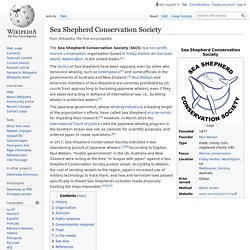

Sea Shepherd Conservation Society. The Sea Shepherd Conservation Society (SSCS) is a non-profit, marine conservation organization based in Friday Harbor on San Juan Island, Washington, in the United States.[1] The tactics of Sea Shepherd have been opposed, even by some who denounce whaling, such as Greenpeace[2] and some officials in the governments of Australia and New Zealand.[3] Paul Watson and American members of Sea Shepherd are currently prohibited by US courts from approaching or harassing Japanese whalers, even if they are observed acting in defiance of international law, i.e., by killing whales in protected waters.[4] The Japanese government, whose whaling industry is a leading target of the organization's efforts, have called Sea Shepherd eco-terrorists for impeding their research.[5] However, in March 2014 the International Court of Justice ruled the Japanese whaling program in the Southern Ocean was not, as claimed, for scientific purposes, and ordered Japan to cease operations.[6] History[edit] Activism[edit]

Piracy. Piracy is typically an act of robbery or criminal violence at sea.

The term can include acts committed on land, in the air, or in other major bodies of water or on a shore. It does not normally include crimes committed against persons traveling on the same vessel as the perpetrator (e.g. one passenger stealing from others on the same vessel). Piracy in Somalia. Map of areas under threat by Somali pirates (2005–2010).
A United Nations report and several news sources have suggested that piracy off the coast of Somalia was caused in part by illegal fishing.[6][7] According to the DIW and the U.S. House Armed Services Committee, the dumping of toxic waste in Somali waters by foreign vessels also severely constrained the ability of local fishermen to earn a living. In response, the fishermen began forming armed groups to stop the foreign ships. They eventually turned to hijacking commercial vessels for ransom as an alternate source of income.[5][8] In 2009, a survey by WardheerNews found that approximately 70 percent of the local coastal communities at the time "strongly support[ed] the piracy as a form of national defense of the country's territorial waters".